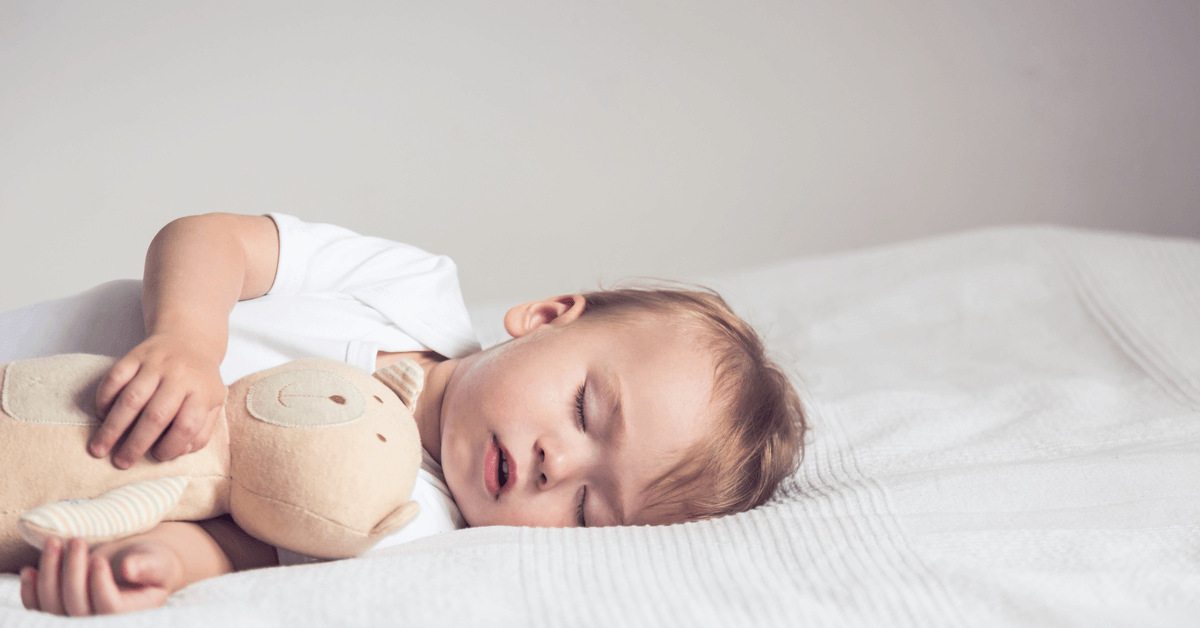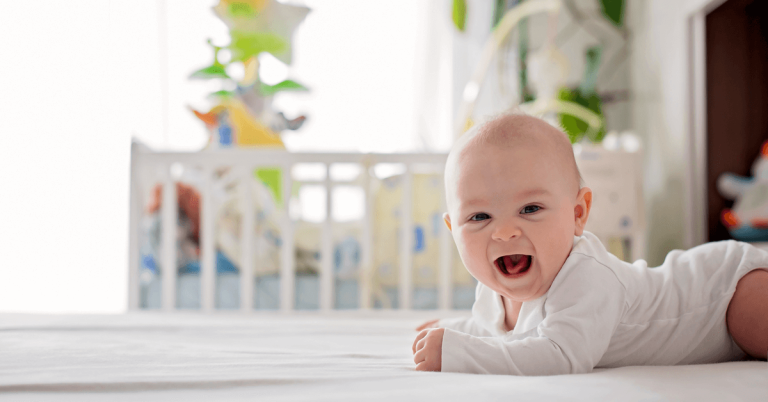One of the most tiring issues for parents is creating the baby’s sleep pattern. Many sleep problems happen to the parents, such as insomnia at night, inability to sleep during the day, night fears, and the desire to sleep with their parents. So, how should one proceed against these problems?
From When Can Babies Sleep in Their Beds?
Babies can sleep in their crib even in the first days after birth. Parents can keep the crib in their room for the first six weeks and reach her more quickly when the baby wakes up at night. Then the baby should sleep in her bed or even in her room.
What is a Sleep Pattern, When and How Is It Created?
Sleep pattern means that the baby sleeps during the day at certain times and goes to sleep at night regularly. Babies show regular sleep movements from the age of 3-4 months. For example, they need to rest for at least 45 minutes three times a day for the first 6-9 months.
Parents should start establishing the sleep pattern and education when the baby is 3-4 months old. Instead of falling asleep by chance, babies have entered the stage of learning to sleep.
The most important issue that parents should pay attention to to create a sleep pattern is that the baby needs sleep biologically, and the more she sleeps, the more comfortable and healthy she will sleep.
For this reason, parents should pay attention to the signs that the baby is sleepy, not let her sleep too much, not get her used to sleeping in the car, swing or pushchair from the beginning, and use the same methods to relax the baby.
Daytime naps decrease to twice a day when the baby is 9-18 months old and once a day in the following months. While trying to establish a sleeping pattern, parents need to accept that this is a tiring process from time to time, that the order may be disrupted on some special days, and that they should be patient with themselves and their babies.
Helping each other will also relax them in this process.
What Kind of Way Should Be Followed with a Baby Who Doesn’t Sleep or Has Difficulty Sleeping During the Day?
Daytime sleep is essential for babies and parents. The baby who does not sleep may be irritable or hyperactive and may show distraction.
Mothers can also be tired, exhausted and irritable because they cannot rest or do other work. The first thing for babies to sleep comfortably during the day is to pay attention to sleep signs, such as rubbing their eyes, pulling their ears, and putting them to bed before the baby gets too tired.
Apart from this, for example, if the baby sleeps twice a day, taking him out at least an hour before the morning and evening sleep, allowing him to get physically tired, but offering calm activities close to bedtime and establishing a sleep routine will help the baby sleep comfortably. If the baby refuses to sleep during the day due to improper conditioning or accumulated insomnia, it may be beneficial to put her to bed earlier in the evening.
The baby who goes to bed early for a few days in a row will need to wake up early and sleep during the day and fall asleep more easily.

What Kind Of A Way Should Be Followed Against The Baby Who Does Not Sleep Until Late At Night?
Babies are biologically predisposed to sleep early from 6 weeks of age. If the parents’ working hours and family arrangements do not allow this, the baby’s sleep pattern will be wrong from the beginning, and the baby will have difficulty sleeping because she is too tired.
In this case, waking the baby early for a few days in a row will regulate her daytime sleep and cause her to sleep earlier. Another point to be noted is that the environment at home in the evening should be adapted to the baby’s sleep time.
“If the lights are dimmed, the television is turned off, there are visitors, and they are in the background, the easier it is for the baby to fall asleep.”
What Is The Way (S) That Parents Should Follow To Make The Baby Sleep Alone In Her Room?
Parents can sit by the baby’s crib in the first months and talk to her in a soothing voice, sing a lullaby, or stroke her. A toy that makes a humming sound that babies are accustomed to from the mother’s womb or ‘rubbing’ can also relax the baby. As babies get older, their time to sleep decreases and their interest in the outside world increases.
For this;
“From the age of 3-6 months, a sleep pattern and night routine should be applied.”
Bathing, massaging, reading a book or singing a lullaby to the baby before going to sleep at the same time every night to implement the night routine will relax the baby and help the baby form the proper habits and expectations.
Then, you can leave the room by placing the baby on the bed, placing a soft and small toy next to it, and leaving it on the bed with the pacifier if it is sucking. Stroking the baby briefly, whispering tender words, or singing a short lullaby before exiting helps the baby feel safe.
What needs to be considered here is to apply all these as a part of the night routine without making it a game. If the baby starts to cry after mom and dad leave the room, they can let her be herself for a while instead of running near her.
If the baby continues to cry, they can calm the baby by softly entering their room and holding them in their arms, again next to the bed with singing a lullaby or stroking. Another method is to take deep breaths in a row next to the baby. When the baby is old enough to learn to imitate, she will be able to breathe with you, actually doing a kind of relaxation exercise and fall asleep more easily.
If they are sure that there is no physical need or problem, for example, that she is not hungry, has clean diapers, and has no gas, the parents have no reason to pick up the baby or lift it from the bed.
After a while, the baby will internalize the parents’ calming her down, relaxing herself, sleeping alone in her room, and falling back asleep even if she wakes up at night.
What Are The Underlying Reasons Why Some Babies Want To Sleep With Their Parents?
It is inconvenient for babies to sleep with their parents constantly, both for the marital relationship and for the whole family to sleep more soundly.
Often, parents, rather than the baby, take the baby to bed when they are not sleeping, either because of fatigue, longing, or because they have given up.
Older children’s desire to sleep with their parents may be due to their need for the toilet, fear, need to feel safe, or inability to get enough time with their parents.
What Kind Of A Way Should Parents Follow Against Babies Who Want To Sleep Next To Them?
First, it is necessary to understand why the child wants to sleep in her parents’ bed. The above reasons are valid; it is best to draw a path accordingly.
In the meantime, if the child wants to get up at night and go to sleep next to the parents, they should quietly explain to him, without turning on the lights, that everyone should sleep, that everyone will sleep more comfortably in their bed and take the child back to bed.
They should be affectionate but a little distant, as yelling, scolding, or making long explanations will cause the child to have negative thoughts. Parents need to be determined on this issue, agree, and show continuity.
What to Do When Children Awaken from Fright?
Children may experience fear from time to time, and their sleep may be affected. In this case, without turning on the lights, it can be comforting to go to her calmly and pat her on the back, comfort young children with a lullaby, and make an explanation according to her age without speaking too long for older children.
During this time, the most important thing is for the mother to remain calm, not to worry and not to panic. Knowing that children have usual fears at certain ages also comforts mothers.
If the child is affected by the dark, it may be necessary to have a night light in the room or a small light in the hallway.
What is a Night Terror?
Night terrors are more intense nightmares. Children who have nightmares wake up scared, wait to be calmed down, and want to tell about their demons. On the other hand, night terrors occur during deep sleep, 2-3 hours after the child goes to sleep. The child may shout, sit on the bed, waving her arms, or even get up and run around the room or the house.
She may be sweating and breathing rapidly, but she is completely asleep during all this. Night terrors often last a few minutes, after which the child does not remember what happened. Although night terrors are rare, the most commonly affect children between the ages of 4 and 12.
Extreme fatigue, the stressful environment at home or school, sleeping in a different climate, febrile illness, use of drugs that affect the brain and nervous system can trigger night terrors. It is also known to be hereditary.
Instead of shouting and shaking the child who has night terrors, speaking in a calm tone by comforting her is necessary. Whatever the underlying cause is, it would be helpful to consult a specialist about it.
Does Mother’s Starting Work After Birth Affect Baby’s Sleep Pattern?
If the mother comes home late and puts her to sleep late to be with the baby, her sleep patterns may be affected. The baby who is awake until late wakes up late the following day, and her daytime naps may also be lost. In this case, it will be more beneficial for the baby if the mother allows the baby to sleep earlier, around 8-8:30 at night, and spends time with her baby when she wakes up early in the morning.
Another issue is that if the mother puts the baby to sleep during the daytime until she starts working, her regularity may be affected while someone else tries to put her to sleep.
To prevent this, the person who will take care of the baby should get used to putting the baby to sleep before the mother starts working, understand the baby’s order and get used to its rhythm.
Would you like to share your experiences and questions as a comment?
Have a nice and healthy day!








